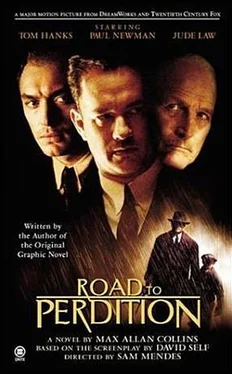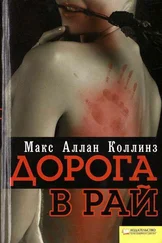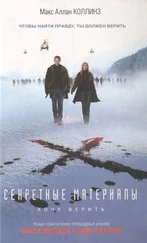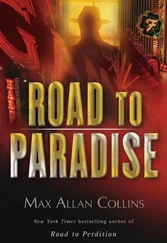“We’ll see you soon,” he said. He put the receiver in the hook.
And across the miles, in the house that had been O’Sullivan’s, on the hallway phone that not long ago Connor Looney had taken off the hook, the mourner who was actually Harlen Maguire quietly hung up the phone, as well.
My memories of traveling with my father are something of a blur — when I think back, I see him behind the wheel, sometimes unshaven, sometimes not. When things between us were strained — as when I was pouting over him dragging me to Aunt Sarah and Uncle Bob’s — I would ride in back, the whole seat to myself (me and the black tommy gun case, anyway), getting as far away from him as I could, in our little world that was the inside of the Ford .
My other memory is the heartland — middle America in all its vastness, sometimes rolling landscape, like a Grant Wood painting; other times flatness stretching to the horizon, winter barren, whites and browns and tans and grays. For every field there was a forest; for every ten barns, one church. The ribbons of concrete and gravel and dirt seemed to extend to eternity, endless sentences punctuated by the exclamation points of telephone poles — reminders that this pioneer country had been settled, that it was civilized now... even if I was sharing the backseat of a Ford with a Thompson submachine gun in a hard-shell case .
I can only speculate on what must have been going through Harlen Maguire’s mind as he tracked us. Surely his photographer’s eye had to have been struck by the abstract beauty of America’s richest soil masquerading, in winter slumber, as wasteland. Or was he too consumed with the mission at hand — was he focused hard on the empty road, a pistol and camera on the seat beside him?
In later years, when Maguire’s photographic gallery came to light, and researchers had access to the grisly photos he’d shot over his grim career, images of our room at the Starr Motel in McGregor, Iowa, were part of the inventory. They were published in a section of the book designed to show Maguire’s interests extended to studies beyond the newly dead .
How odd it was, so many years later, to open up an oversized art book, with its slick pages, and find an introduction that noted, “Maguire’s fascination with murder victims is perhaps as controversial as the Diane Arbus predilection for posing the retarded.” How strange seeing Ansel Adams-ish midwestern landscapes in a section that included stark photographs of that empty motel room, with an emphasis on a plaster Madonna on the nightstand, “left behind by some nameless traveler” (the caption writer said) .
Particularly odd, particularly strange, when that nameless traveler — me — knew full well that these were not abstract art studies at all, but evidence of the man who had tracked my father and myself, down lonely heartland highways .
Father and son were in Missouri now, traversing rolling prairie land, cutting down State Highway 13, where at a town called Collins they would take the road into Perdition, near Fall River Lake. O’Sullivan stopped at a roadside diner outside Bethany, a boxcar whose “We Never Close” neon made a ghostly glow at dusk.
They had driven all day, and said little to each other. O’Sullivan was lost in thought, working out a plan to force Nitti and Capone to abandon their support of the Looneys and turn Connor over to him. But he could not make it work, a man alone, and no matter how he mentally rearranged the cards, the hand he’d been dealt did not seem a winning one.
He knew his son was sulking, but that only made the boy less trouble, so he let it go. They’d eaten lunch at a small-town café, and the boy had again snookered the help into making him a breakfast. O’Sullivan’s own appetite remained stunted, and he’d picked at his Salisbury steak.
Now, many hours of driving later, the man was ready to give eating a try again; and his son should have some food.
In the boxcar diner’s parking lot, O’Sullivan pulled into a stall adjacent to the window on an empty booth. He turned to his boy, in the backseat. “Hungry?”
Michael was reading one of the little comic-strip books. He didn’t look at his father when he grunted, “No.”
“Might not be another diner for a while,” O’Sullivan said.
The boy shrugged. “I’m still not hungry.”
“You should eat something.”
“I’m reading.”
That was all the effort O’Sullivan was prepared to give it, and he got out of the car, leaving the boy to his book and his brooding. Inside the brightly lit green-and-brown diner, business was slow for this close to suppertime — a farm couple in a booth having a meal, a farmer drinking coffee at the counter.
Leaving his topcoat and fedora on, he took the booth next to his car, where he could see Michael’s head in the backseat, looking down at his book; he could also see the diner’s door, from here. A waitress came over, a blowsy brunette with plenty of lipstick and just as much personality. “Ruby” was stitched on her uniform blouse. She brought water and coffee.
“You look like a hundred miles of bad road, sweetie,” she said.
“That’s a low estimate,” he said. Hunger was finally stirring, and he also thought he might be able to stir his son into eating by making a show of a meal. “I want a T-bone, rare.”
“How rare, sugar?”
“When I stick in the knife, if it doesn’t moo, it goes back.”
“Okay, Dracula. Mashed or fries?”
“Mashed... Pay phone?”
“No public phone. I’d let you use ours, but the manager ain’t here.”
“I really need to use the phone.” He held up a sawbuck. “I’ll make it quick.”
She snatched the ten-dollar bill out of his hands before he could change his mind. “It’s by the register.”
O’Sullivan was already heading toward the phone. “Okay — watch my booth for me?”
“Sure, honey.” She eyeballed the nearly deserted diner. “I’ll see if I can hold back the crowd.”
He made the trunk call to Uncle Bob, who said, “No, Mike — not a crow on the fence. No strangers in Perdition, neither.”
“Good. You should see us tomorrow, late.”
“Fine. Sarah’ll be home by midafternoon. We’ll have ourselves a reunion.”
“I won’t be staying long.”
“All things considered, that’s probably wise. Meaning no offense.”
“None taken.”
He was saying his good-byes when the bell over the door dinged, and, just as the farm couple was leaving, a cop came in — a man in his forties who’d never missed a meal. The blue uniform indicated a town cop, not a sheriff’s man or state policeman. The cop nodded and smiled to O’Sullivan, who nodded and smiled back, hanging up the phone.
The cop settled on a stool near, but not next to, the farmer, who was having a piece of apple pie.
O’Sullivan considered leaving, but Ruby was on her way with his T-bone, smelling very good indeed (the steak — Ruby’s perfume was another matter), and his instincts said the cop’s presence was innocent. So he sat in the booth and dug in, using a steak knife on the nicely rare piece of corn-fed Missouri beef. He glanced out the window, to see if this was tempting Michael, but the boy’s head was no longer visible.
Knowing the boy was probably stretched out sleeping, O’Sullivan nonetheless wondered if he should go out there and check on him. Night had smothered dusk, and that was just enough to make O’Sullivan edgy. He was sipping his coffee, looking out the window at the Michael-less backseat window when the bright sweep of headlights, a vehicle coming into the diner parking lot, made him wince.
The driver parked, got out — O’Sullivan noted the uptown topcoat and bowler as atypical for this rural area — and glanced at O’Sullivan’s car. Something about the glance was less casual than it tried to be. In his booth by the window, O’Sullivan craned his neck, trying to see the front license plate, couldn’t, and as the bell over the door dinged, he returned to his meal.
Читать дальше












